Prime Minister's discussion with Neil Rimer: Endeavor End of Year 2023 Event, Transcript
By Endeavor Greece Jan 21, 2024
Endeavor Greece End of Year Event
Speaker bios here
Costantza Sbokou Constantakopoulou: Welcome to Endeavor’s end-of-year celebrations where we celebrate a high-impact 2023 for the Greek high-impact entrepreneurship. Thank you all for being with us today and thank you to the leadership of the Hellenic Bank of Development and Investments for their support in putting together this great night for the entire ecosystem.

Endeavor’s work is important and meaningful to many countries that are in a transformation process, like Greece. Specifically in our country, Endeavor is bringing together a broad international community of high-impact entrepreneurs who are pushing the boundaries of our country’s innovation in ways that have never happened before.
In Greece, in the last few years, we have seen a truly remarkable and inspiring shift in the market’s momentum. The Greek entrepreneurial resilience and innovation, that endured the difficult years, are now accelerating, propelled by a stable market and a thriving local environment.

Our turnaround story is making global headlines and there is an increasing number of new success stories coming from Greece: from Blueground, Workable, Hack the Box, and TileDB to the Innovation Centers launched by JPMorgan, Microsoft, Pfizer, Cisco, and many more. Only in the last two years (2022 and 2023), the Greek startups have raised close to $2B in debt and equity investments and have surpassed the $10B in total capitalization. They employ close to 25.000 people and have offices in 20+ countries where they build world-class technology, scale their teams, and buy-out competitors.
Just over a decade ago, this reality was unimaginable and as we look into the future, we believe that the Greek economy has everything that is needed to play a larger global role and for Greek Innovation to make even bigger strides towards the Greek Transformation.
This is, I believe, the message we want to share with you tonight, that the Greek innovative entrepreneurship has persevered and now is flourishing and is building a better future for not just Greeks but for the world. There is a new generation of high-impact entrepreneurs in Greece, that we at Endeavor are committed to supporting. They are coming from local, diaspora, and international paths and are pushing the boundaries of the Greek market and societal transformation and are creating world-class opportunities in our country.
Endeavor is their platform, their supporter, their investor, and their ambassador and we would like to thank every one of you tonight, for helping us in this mission.
We have a special and unique fireside conversation planned for you. I would like to invite Neil Rimer, co-founder of Index Ventures - one of the first and most influential Venture Funds in Europe - and our Greek Prime Minister, Kyriakos Mitsotakis to join us on stage. The conversation will be moderated by the Managing Director of Endeavor Greece, Panagiotis Karampinis.

Panagiotis Karampinis: Dear Prime Minister, dear Neil, thank you so much for joining us tonight. It is a special night: First, because a conversation between the Greek PM and the founder of one of the largest Venture Funds in the world that has transformed Europe is meaningful and happens for the first time. Then, because we decided to make it a little bit more special by hosting your conversation at a completely transformed Athenee, a beautiful venue that has never hosted a panel discussion before. I hope you like what we have done with the place. It's completely different from what it used to be just a few hours ago. I would like to start with you, Mr. Prime Minister, because it's a timely conversation at the same time, only less than 24 hours ago, Εconomist listed us as the top-performing market for the second consecutive year, which is extraordinary and would have been unimaginable a few years ago. I would love to ask you if you have any preliminary thoughts as this is fresh from the news.
Prime Minister: First of all, thank you very much for inviting me. I would also like to pay a special tribute to the Endeavor team, to Costanza, to you, and to the Board of Directors. I think you've done a fantastic job since Endeavor first set up shop in Greece. Let me also pay tribute to the founder of Endeavor who is somewhere here (Mareva Grabowski). I would like to tell you an interesting story: I know the founder of Endeavor, Linda Rottenberg, and we were classmates at Harvard. At the beginning of the crisis, I approached her and said “I think you need to set up an operation in Greece”. Linda replied “we don't do European markets, we are only in emerging markets”. Then, two years later, Mareva pitched her the same idea. And guess what happened? Endeavor Greece was set up. I'm very happy about the work that Endeavor has done and I think you have been instrumental in supporting this emerging ecosystem of Greek startups.
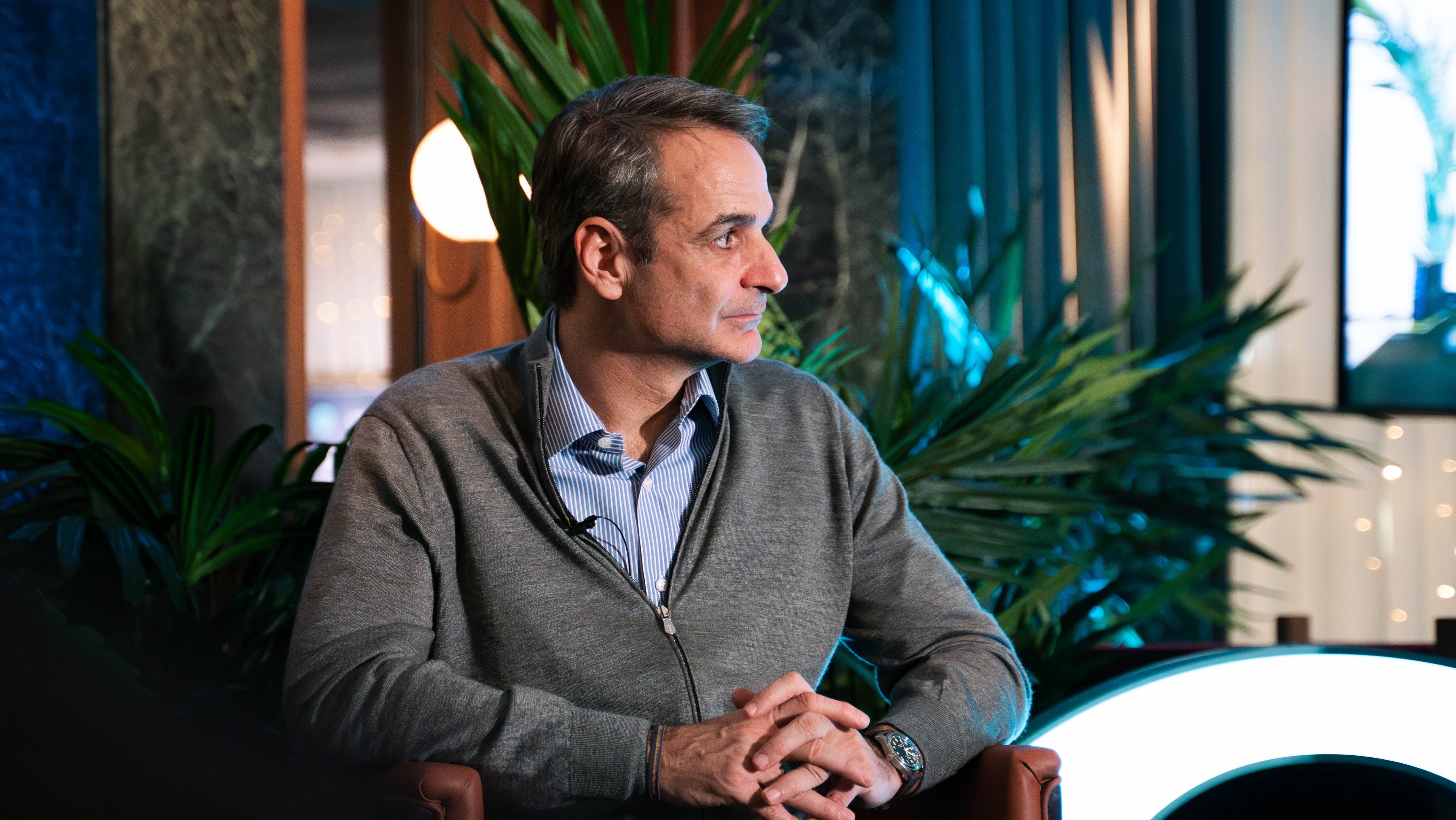
To get back to the question that you raised, indeed, it was a very pleasant surprise that the Economist ranked us the best-performing economy. All the OECD countries are looking at various indices and I think it is a meaningful confirmation of the important job we have done in transforming the Greek economy and putting it on a sustainable growth path, while at the same time making sure that we responsibly manage the public finances. And of course, I think part of the success of the Greek economy is also related to the fact that we've been able to diversify from sectors such as Tourism which of course continue to be very important for Greek growth and drive growth into new sectors as well. The startup ecosystem and the investments that we have made in new technologies are important contributors toward changing the productive model of the Greek economy.
When I look at the headline figures, yes, the growth rate is of course very important, but I am more concerned with the reduction in unemployment, the rise in the average wage, and of course, the fact that the Greek economy has become much more extroverted over the past years.
Exports now constitute 50% of our GDP, equally split between goods and services, and this is probably the best indicator that our strategy is actually working. I think we're just at the beginning. Why? Historically, if you look at the performance of the Greek economy, we had relatively long cycles of good years followed by long periods of bad years. So, I do think that the conditions are appropriate now to be more optimistic and more bullish about the Greek economy for the long term. We're at the beginning of our second term, we have a strong majority in Parliament and we remain totally committed to all those reforms that will improve the overall productivity of the Greek economy while embracing all the new trends. We are also committed to trying to understand what the new world of artificial intelligence may bring for us in terms of opportunities and risks. I think it is also important, especially for those who live abroad and are thinking about returning to Greece, as well as for the venture capital funds that are looking to invest in Greece, to know that the whole perception of the country has changed. Greece is a very different place from what it was five years ago, and it took us a lot of time to convince the global investor community that we have moved on from the bad years for good and that we're at the beginning of, what I consider to be, a virtuous long-term cycle. To conclude, I am pleasantly surprised by The Economist's ranking, but markets always like contrarian stories, and I'm sure that the Greek turnaround story is a story that resonates with a lot of people not just within Greece but also in the global investor community.

Panagiotis Karampinis: The Greek turnaround story definitely resonates with a global community. And we are experiencing it every day in our work where we work with entrepreneurs and investors from all over the world. We see the difference in momentum and market perception. Today, our audience here is the majority of top founders and the top VC investors of the Greek Innovation Ecosystem, who are the protagonists of the Greek transformation. So for those from the audience who are not aware, I think you will find it very interesting to know that the Greek Prime Minister paved the way for the VC industry in Greece 25 years ago. Prime Minister, you founded NBG Ventures in 1996, which to my mind sounds like a completely different world from what we are working with today. And I'm wondering, how do you reflect on this growth that has happened in Greek entrepreneurship over the last 25 years? How do you reflect on this change that has happened in Greece since then?
Prime Minister: I was working as a consultant in London and when our first daughter was born we decided to return to Greece. I first took up a job with Alpha Ventures and left in 1999 to set up the venture capital operation of the National Bank of Greece. And of course, it took us a lot of convincing at the time to explain why this was an interesting opportunity for the bank. I also set up the first technology fund and the first incubator in Greece in a very different period. I think in a way, we were probably a bit ahead of our time. Despite that, some of the investments we made turned out to be very successful companies. But clearly, at that time, I think the stars were not properly aligned. I sometimes reflect on that going through this major crisis as a nation, we understood that we had to recalibrate our priorities. I think one of the side effects of the crisis is that people became more entrepreneurial. At the beginning of this century, getting a job in the public sector or a well-paying job in a private company was considered to be a natural career path. This is no longer the case and I'm always fascinated when I see our university students, or even our high school students, go through great competitions such as Junior Achievement and be interested in entrepreneurship. And remember, the more success stories we will have, the more our young people will realize that this is actually a viable career option, certainly worth considering.
Greece now has most of the ingredients in place to build upon what is already a booming startup ecosystem.
I have very fond memories of my years in the space of entrepreneurship. I still know some people who have persisted from my days, some people who I actually hired when I was running that small operation for the National Bank of Greece and who have stayed faithful to venture capital and private equity. The progress that the country has made is fascinating.

Panagiotis Karampinis: Thank you so much. Neil, I think it's around the same time you co-founded Index Ventures, one of the funds that have played a pivotal role in what is today European tech in 1996, you stepped down in 2021. Yeah. I'm wondering, how do you reflect on this outstanding career?
Neil Rimer: First of all, thank you for this opportunity, and thank you for being here. I reflect on it every day. It was a tremendous privilege and it was very ambitious of us in 1996 to think that we could make a dent in the world of venture capital. But we set our objectives on, competing with the best firms in the world, which at the time were in Silicon Valley, because we decided that if we were just going to try to be the best in Europe or the best in Switzerland, in Germany, Austria, it wouldn't matter because, at the end of the day, the funds that we invest, the institutions that give us money are looking for returns that compensate them for the huge risk that they're taking in this category. And if you're not able to be in the top percentile, it doesn't matter what your strategy is, they're not investing in you. So we took the bet that in Europe, we could find entrepreneurs and businesses to invest in that would allow us to compete with funds in the US, and like the Greek Prime Minister, I think, we were probably too early, ahead of our time. But in hindsight, I'm happy that we started then because we learned a lot and in that period of time, we've seen tremendous change in Europe. Back then, we had to start all of our meetings with a slide that explained what venture capital is. It wasn't just the fact that people didn't know what it was, even pension funds didn't know, Governments didn't know. We don't have to do that anymore. People now understand that this is part of the financial system, the highest risk - highest return part of it.
Venture Capital plays an important role in a lot of portfolios, but importantly, it drives innovation, job creation, and enterprise creation in many economies.
And we're very pleased to see the transition, the transformation that's happened in Europe. But we also recognize it's really just the beginning.
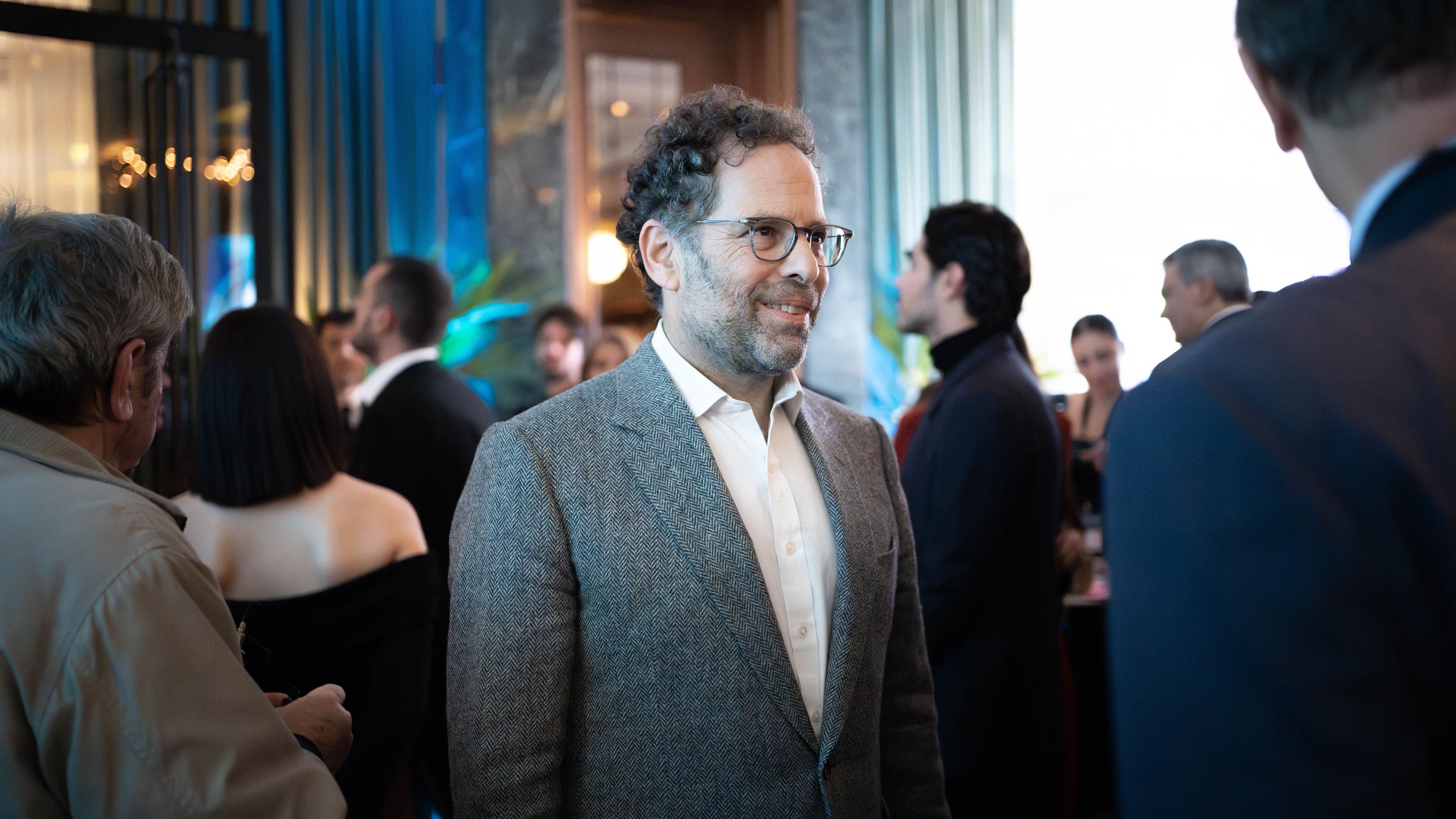
Panagiotis Karampinis: We are very appreciative of what venture has contributed to the growth of innovation and human potential. As well as the incredible job you've done. Index Ventures has made some investments in startups founded by Greeks, which is interesting and we hope for more in the future.
Neil, you probably have met tens of thousands of entrepreneurs over that incredible career. We recently did research at Endeavor, we mapped the journeys of 200 founders that have created a $1B+ in valuation companies, or unicorns as we call them. We found some incredible insights, like ⅓ of these founders, are immigrants or second-generation immigrants, only ⅓ of them have a degree from an elite university, and ½, half of them have previously worked for another startup. These are findings that have a huge value for the education strategy that we should have as ecosystems and where do we find incredible talent and outliers. I'm wondering Neil, what are your insights on the traits and characteristics that you've consistently seen that outlier entrepreneurs demonstrate?
Neil Rimer: Well, the demographics that you talked about are very representative, in our portfolio as well. And I guess that it has something to do with learning how to struggle early on in life. Not being entitled and feeling like you have to go out into the world and prove something. I think that's important because it takes a certain amount of sacrifice to build a company. We've also seen some entrepreneurs who didn't have that backstory. But what they all share is a kind of maniacal drive to bring something into existence in the world. A product, a business model, a new way of doing something. Sometimes things that are not even entertained by the current legal system, and they won't stop until they get there. So they have this sort of stubbornness and self-belief, but they also have this ability to pick up their heads once in a while and realise they need help and ask questions from people around them. They are open-minded, willing to change their mind, but, once they've made a decision, they go back into being a bull charging forward. That combination of traits is a rare combination, I think.
Outlier entrepreneurs are also evangelists. They can raise money, they can attract co-founders, they can attract employees, they can sell products, they can change regulations.
They can do a lot of things because they are charismatic and they believe in what they are doing.

Panagiotis Karampinis: I have always thought that one of the biggest competitive advantages of Endeavor is that it's a network that is predominantly populated by the founders you described, Neil, the high-impact and high-talent founders that bring incredible success stories. As Endeavor Greece, we see our role, being a local office in this global network, as the ambassador of the Greek potential. So every day we reach out to Endeavor Entrepreneurs around the world, and we ask them to set up operations in Greece.
And the first question that we are faced with is: how realistic is the expectation to set up operations in Greece and then be able to scale them up from there?
The incredible Greek recovery is of course a big encouragement but I'm wondering, Prime Minister, how do you think of the strategy going forward in setting up a thriving ecosystem? What are your priorities in making Greece a fruitful environment for companies to scale up, not just operate?
Prime Minister: One can point out numerous factors. First of all, there is already a thriving ecosystem in Greece. So most of the pieces are in place for the community of people who are active in the entrepreneurial ecosystem. We've changed laws and regulations to make it easier for people to return with specific tax breaks. Our stock option scheme, I think, made a big difference in terms of aligning our tax regime with what, essentially, is common practice in the startup world. Regulation has, to a great extent, been simplified. It's easy to set up a company in Greece. A digital state is helping a lot in terms of the interaction between companies and the bureaucracy. We're still not there yet, but it is much easier to set up a business in Greece today. If you look at what is our comparative advantage, I think to a great extent, it is our talent pool. And the fact that, despite the difficulties, we have a good public university system that produces eager graduates who are much more knowledgeable about the opportunities of employment in the startup world. And, of course, I think you cannot beat the quality of life argument, which is very important. We saw it during the pandemic, with digital nomads resettling in Greece at a time when you can work out of anywhere if you have good connectivity. These factors are becoming increasingly important. And what I find fascinating is that you see technology clusters developing not just in Athens or Thessaloniki, but in cities such as Ioannina, for example, or Patra or or Iraklio. This is in itself a very interesting development. It's no coincidence that these ecosystems are usually attached to good-quality universities. Another advantage that Greece has is its Diaspora and the hundreds of thousands of Greeks left during the crisis. The people who move are usually the risk takers, it's not easy to resettle away from Greece. And risk-taking, as Neil pointed out, is very much correlated with a successful career in the entrepreneurial world.
Many of these people, at some point, would like to return and they will only return if there are good opportunities in Greece as well as if they have a belief that the country is fundamentally on the right track.
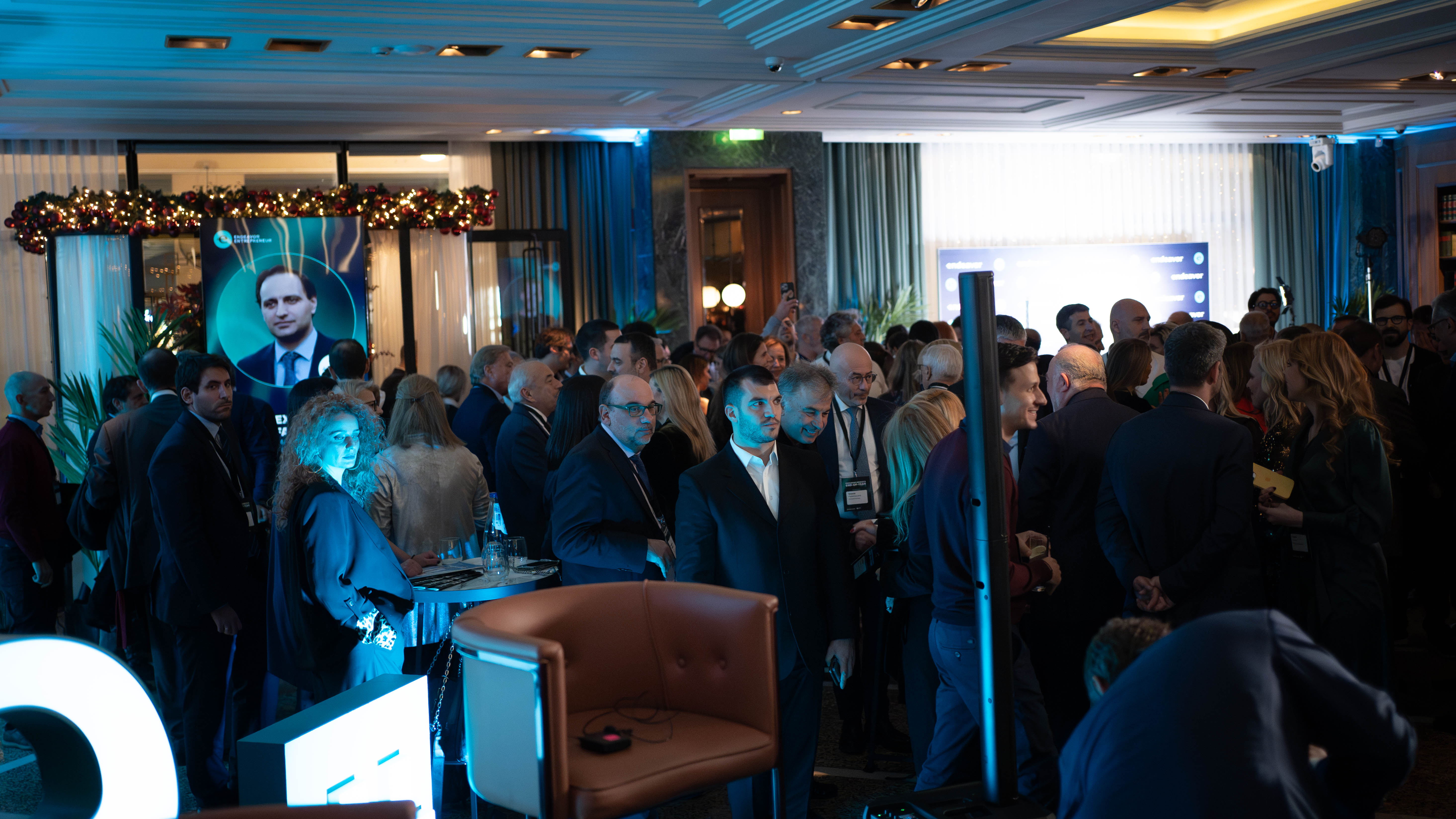
That is because it's never an easy decision to resettle and then return to your home country. So, the basic ingredients are there and we are constantly looking to learn more from the entrepreneurial ecosystem and this very unique, sort of almost egalitarian culture that it tends to cultivate. And how can we also infuse even the state itself and the way we run the government centrally, with the logic of successful companies that have grown very quickly? Some of the traits that Neil pointed out that he wants to see in successful entrepreneurs to invest with them are not that dissimilar to the traits we're also looking for. You have to be completely committed but at the same time value the diversity and the different approaches. And at the end of the day, you really have to believe that what you do is important enough to warrant all the energy that you put into the effort. I'm always looking at the entrepreneurial community to advise us on what we need to do beyond what we have already done. And of course, our doors are always open to see what more we can do to further boost what is already a very vibrant entrepreneurial ecosystem.
Panagiotis Karampinis. Neil, the Prime Minister talked about the stock option plan and the legislation that they've passed in Greece. And that's a nice coincidence because Index recently wrote a big policy paper on the European employee stock options. I'm wondering what are your insights from that, but also if you have any other insights, what turns rising ecosystems into dense, productive innovation ecosystems?
Neil Rimer: We've done a lot of work on stock options over the years because we felt like it was one way that we could try to help the entire startup ecosystem and create more opportunity for everyone, including ourselves as investors. But, just more broadly in the entire ecosystem. So we benchmarked stock option systems in different countries and compared them to each other in terms of how favourable they were for employees, how easy they were to implement and manage, etc.

Panagiotis Karampinis: Greece was not on the list, right?
Neil Rimer: Well, it wasn't on the first list, but we did some work before this discussion and we kind of looked at it. Actually, one of our policy advisors is here and Greece is with the new format on the stock options, between the US and France. So it's actually doing fine. So congratulations on that. The important thing is that you're not taxing stock options at the time of the grant, which kills the incentive of a stock option plan. So that's really important. By the way, one thing that I think would be really interesting, when you talk about scale-ups, would be to work with a handful of key EU states, so that you can passport these schemes across countries. Because if somebody builds a business here and then wants to set up something in Germany or the UK, it would be unfair for those employees not to get the same tax treatment– or something at least as good as the Greek tax treatment. And obviously, it could be mutual, right? So employees can move across these boundaries and not lose the benefits of a well-structured stock option plan.
Prime Minister: Can I just make a comment on this because I think this is very important. I talk to quite a few entrepreneurs and we always ruminate at the level of the European Council, what can we do to foster competitiveness in Europe? And when you look at the overall statistics in terms of scaling up, creating really global giants, Europe clearly is lagging behind both the US and China and sometimes there are no easy solutions, such as making sure that the single market actually works, especially for digital services, that we need to place more focus on.
What you mentioned is a very, very good example of changes that we can make at the European level to ensure that we actually have one common market of almost 500 million potential customers, into which a startup from any European country can actually tap into.
We are clearly not there yet in terms of what we need to do to make the single market actually work as flawlessly as it was first imagined.
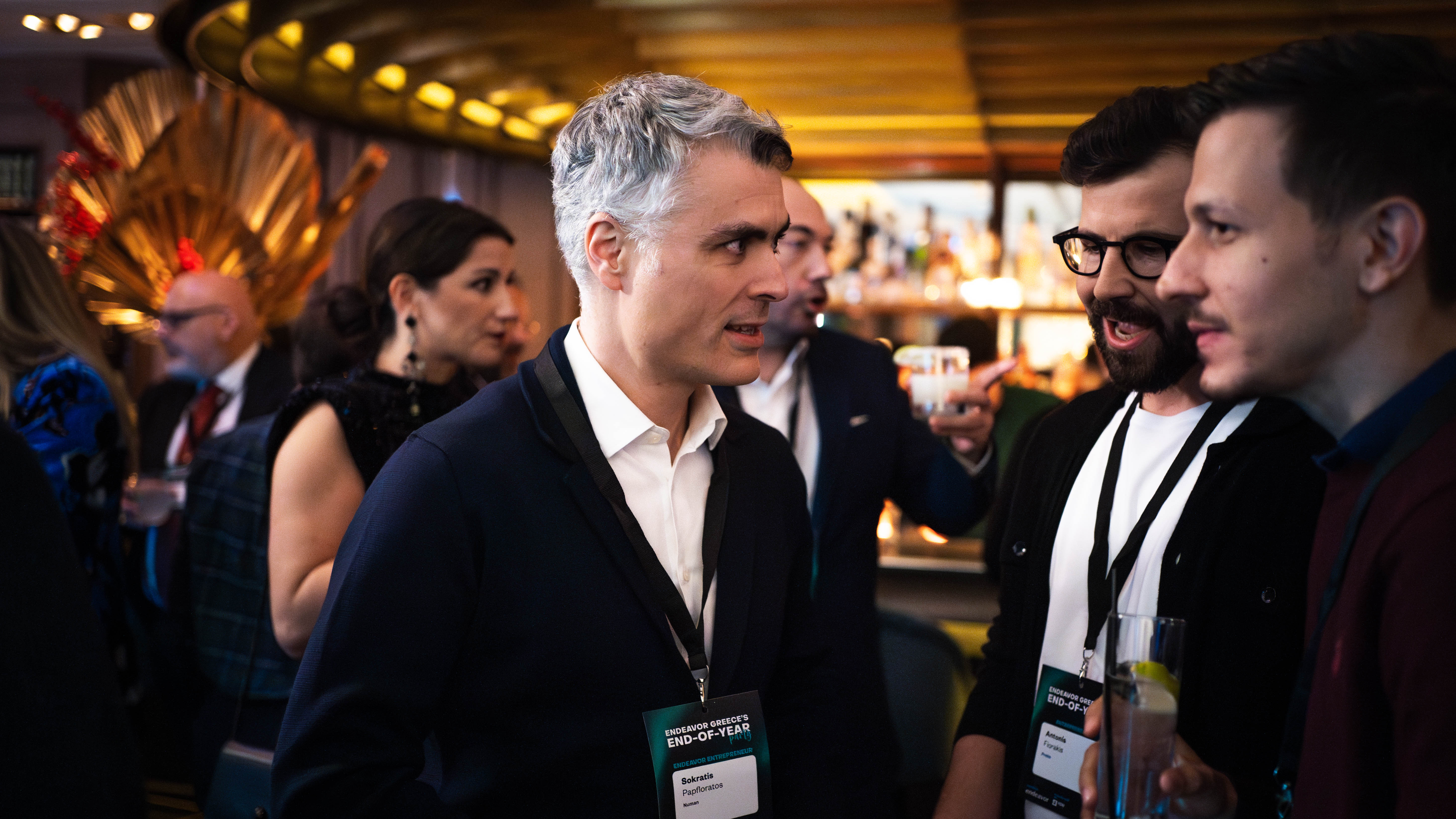
Neil Rimer: You asked about ecosystems and how they develop and what we've observed is, you have some countries where they've done this by design. You know,
they sat down and said: we're going to make technology innovation, enterprise creation, the core of our economy.
A few have done that, I think the UK has more or less done that and Israel has, Estonia too on a smaller scale. That takes a lot of activation energy, but once you get that going, it will survive multiple leaders. It doesn't depend on a single leader who is trying to make this happen. It will continue, it has critical mass and critical velocity. Some other ecosystems, like France, Germany, and the Nordics have done this kind by accident. They sure pay lip service to these things and everybody wants to be the next Silicon Valley but they also have a lot of other industries that are trying to maintain and protect. And then what happened was that they had a massive success all of a sudden and everybody says, “What happened? What was this company?” In France, for instance, a company called Criteo in 2013, went public, and overnight there were 60 employees who became multimillionaires and they started their own companies and they invested in venture funds and they started their own funds. And so, then the country gets behind this and says, how can we make this happen more systematically, let's listen to these people. Let's have a dialogue.
Panagiotis Karampinis: That's why we started our conversation with the video with the Endeavor multiplier effect. This is something that sits at the core of what we are doing at Endeavor.
We know that huge success stories can have such ripple effects in local markets that they can completely turn them around, and it only takes just a couple of such success stories to see the transformation momentum.
We have been mapping these multiplier effects for 25 years now at Endeavor. I'm happy that you also talked about regulation - EU regulation - because the final topic of our conversation today is Artificial Intelligence. AI has captured the fascination and imagination of the world right now. At the same time, we like that there is now a high-level advisory committee for AI that you set up, Prime Minister. Actually, our Vice Chairman, Andreas Stavropoulos, is a member of that committee. I'm wondering, how do you think of AI as an opportunity or, how AI is changing your national strategy? And if you think that there are leapfrog opportunities for Greece, in this space.

Prime Minister: That's the point of the committee we set up, the brief that I gave to the group of very talented people was very straightforward. First of all, how can we use AI to make public policy better? And which are those areas that can actually be transformed by AI? We've just introduced our AI chatbot for gov.gr. I'm surprised by how articulate and polite it is when you ask it clearly provocative questions, which gives you a very good indication of the real capabilities these large language models have to further simplify the interaction between the state citizens and businesses. But of course, the opportunities are numerous, from tackling tax evasion to applications related to civil protection and early fire detection.
Let's look at those policy areas that can actually be transformed by AI and let us try to run pilots and implement cutting-edge technology to deliver better public policy results.
The second vertical is, let's look at Greece and the technology ecosystem. How can we help our startups be more active in the AI space and within this broad universe? Is there an area where we should focus in particular? And the third aspect of the work is related to regulation. What is our national strategy when it comes to regulating AI, and how does it align with the AI act and the European initiatives? There is a dimension where I believe we should really be global thought leaders and that is the area of ethics of AI. I mean, if we don't do it, who will?
I would really like to make Greece the global focal point for these discussions. There will be fascinating new questions arising with AI, which I don't think we have pondered sufficiently. And there will be new philosophers of global reach who will really leave an impact in terms of how we think about all the ethical dilemmas associated with AI.
And I think there is clearly this connection between artificial intelligence and another type of AI. So the ancestral intelligence that Greek civilization can bring to the table makes it a sort of an obvious choice for us to focus more specifically on this particular area. So, the advisory team is very active. They are already producing a lot of interesting documents, they have taken their job very seriously, and I'm happy about that. And I'm also happy about the fact that we seem to have a very high representation in terms of the global AI scientists. Greece is relatively well represented. So, globally we have many people who do cutting-edge work when it comes to AI. First of all, we'd like to know them and what they do and make them aware of the fact that we're trying to do something meaningful with AI in Greece.
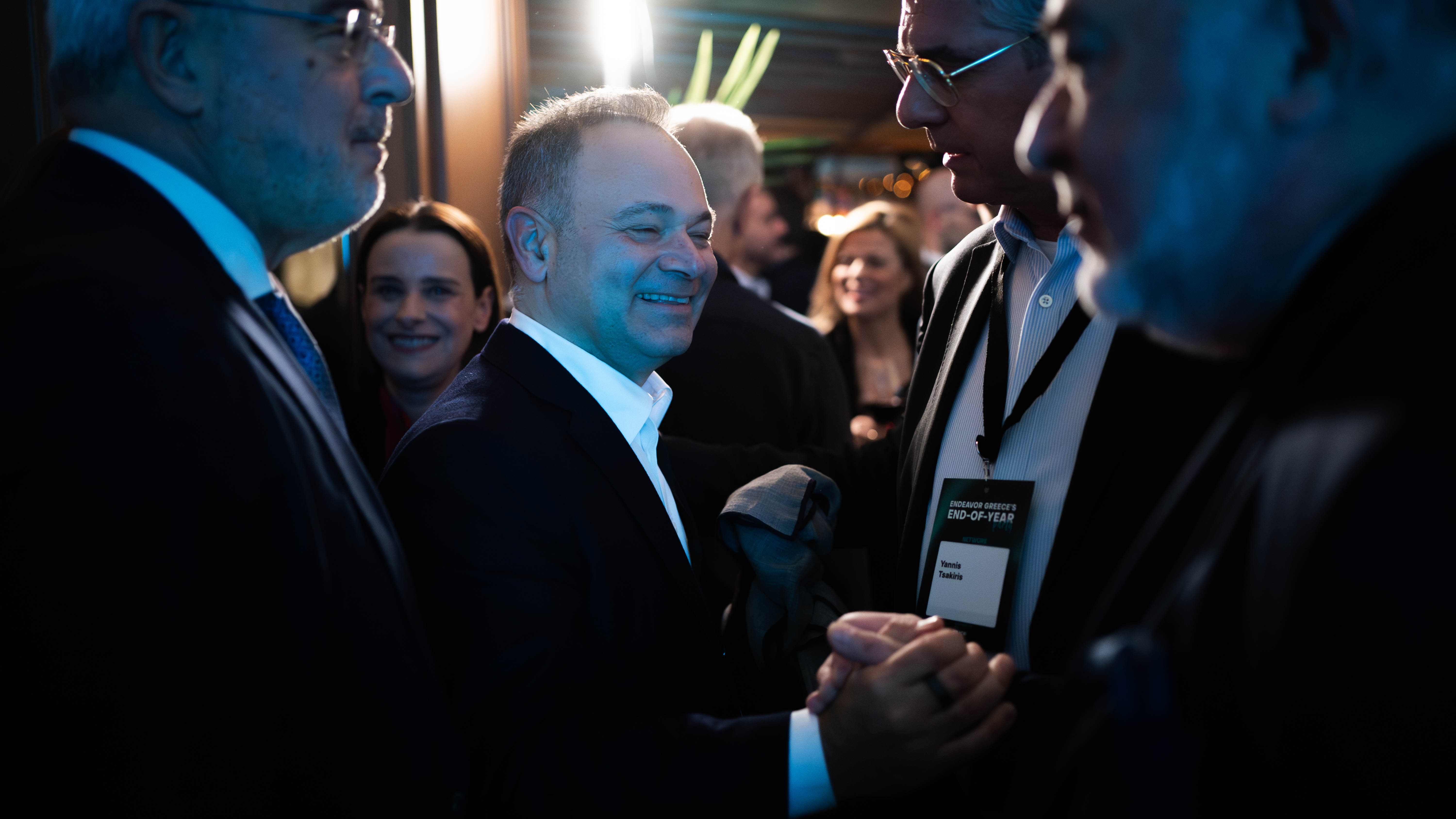
Neil Rimer: I'm glad because I knew at some point somebody would find the explanation for how Greece invented AI and I'm glad I was here to hear it first! But, I totally hear you on ancestral intelligence. And, by the way, I'm not sure people probably don't understand why I'm here. They don't understand that I have a connection to Greece.
Panagiotis Karampinis: We were for coffee earlier on and you ordered in Greek. So, yes, please tell us.
Neil Rimer: I just wanted to make it clear that I was born in Canada. I moved to Switzerland, and we started our company in Geneva. But I married a Greek and we've been coming to Greece for a long time. I only say that because I don't want to come across as critical. I'm actually very supportive of Greece, it has a very big place in my heart and I want to see it thrive, succeed, and be everything that it deserves to be in this world. I do think that AI offers an opportunity. I do think that you've covered, Mr. Prime Minister, a lot of the assets and the reasons why people would want to live here and would want to build a life here and build a business here. But AI is the kind of technology that comes around every, I wouldn't even say every decade, but several decades. And it levels the playing field. We have many portfolio companies that have been doing super well, but now they're worried because this new thing has emerged that could obviate the need for what they've been building and selling. And of course, they're trying to tell themselves, how do we reinvent ourselves? But it's very hard to reinvent yourself when you already have a product/service launched and in the hundreds of millions of dollars in revenues and your company is already in the thousands of employees. You are committed to the direction you have set and someone can come out of the left field with three people and a prototype and bypass you and everything that has been built up until then I think that offers an amazing opportunity for engineers, for scientists, for linguists, for philosophers, for a lot of people who will attack these markets with a completely fresh perspective.
Panagiotis Karampinis: Are any specific verticals or applications that you see really taking off in 2024?

Neil Rimer: It's very hard to say because this is so horizontal. It will affect everything.
It will affect financial services, education, language learning, and tax preparation. It will affect aircraft design, advertising, and entertainment. Everything!
For instance, when talking about scale, think about entertainment which we talked about earlier. I do think entertainment and gaming is an area that opens the world to any developer. These creators can get their products on the App Store and have instant global relevance. And we've seen that play out in some places. And why not in Greece?
Panagiotis Karampinis: Prime Minister. In December 2023, we were for the second consecutive year, top of the charts economy. How would you like 2024 to be at the end of it for the Greek economy?
Prime Minister: Well, let's make it three in a row. Of course, it's good to break out of a vicious cycle and enter what looks like a virtuous cycle. But there is no room for complacency. And we still have a lot of ground to cover. People always tend to forget the tremendous cost that we have to pay. As a result of the financial crisis, we lost a quarter of our GDP. We're still not back to the levels we had reached before the crisis. Essentially, the country went bankrupt. So, we know we need to run and we need to seize the opportunities.
Whenever we have an opportunity to leapfrog others, we need to be bold enough to at least explore those options.
I think that we will continue to maintain growth rates, which are significantly higher than the rest of the rest of the eurozone. We will continue to bring down our debt as a percentage of GDP. We know we have to run a tight ship because the era of lax fiscal policy is over. So we know we need to produce primary surpluses. But I think we have demonstrated that you can grow the economy, lower taxes and maintain fiscal discipline at the same time. Many people thought this was not doable, but we've proven that you can actually increase the pie, and then it is our job to ensure that everyone has an opportunity.
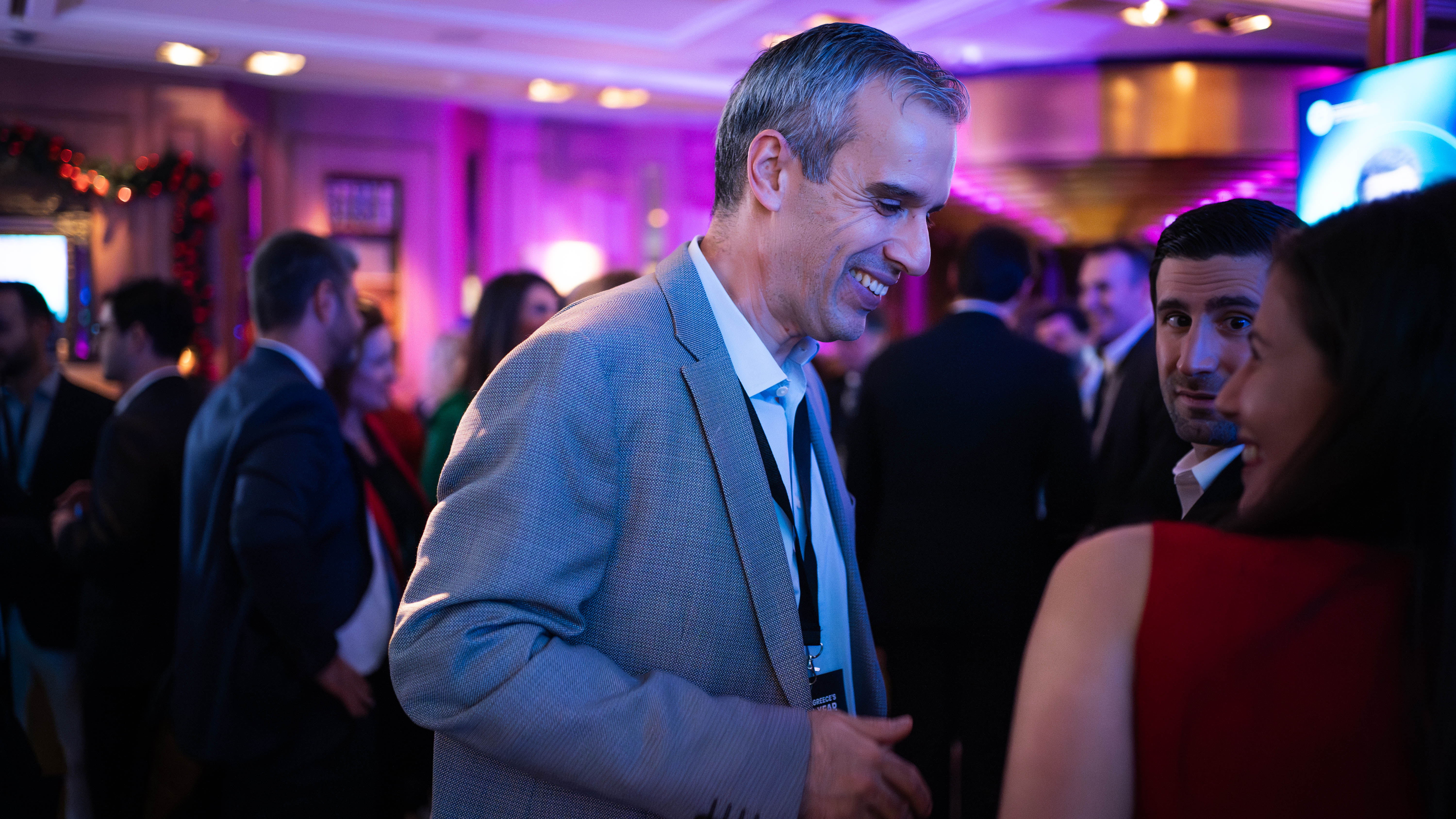
What I find so fascinating about the tech ecosystem is that indeed there is a playing field. You can start anywhere in Greece, a startup, and if you are successful you will be rewarded. And this egalitarian culture of the startup ecosystem, which does not reward connections, access to media, access to politicians, but just rewards the quality of the product or the service that you offer is something that I find fascinating and something which is redrawing the map of Greek business because you have a new generation of businesses, created over the past years, that will start to play a prominent role in terms of shaping policy.
I think that all established companies also have something to learn from the way startups do business, in particular when it comes to recruiting, retaining, and rewarding their employees.
I've been pushing the big companies to be much more aggressive in terms of the stock option schemes that they use to reward their employees, because there is, in my mind, nothing more rewarding than to feel that beyond your salary, you also have a direct stake in the success of the company. And there is ample literature to actually support that. So in my mind, this new ecosystem that is emerging can teach us a lot and I would certainly hope that it also does shake up the traditional business establishment in Greece. We certainly, as a public sector, want to be very innovative and work with companies.
We're making our data very accessible. I was Minister of Public Administration when I signed the first law regarding open data, back in 2014. We have lots of data and, with full respect to all our privacy obligations, we want to make that data available to solve important problems. I'm sure that there must be a solution to the Athens traffic problem that is related to managing just the amount of data and the way the traffic lights work. It's not going to solve the whole problem, but it can certainly make our lives much easier. This is just one of the numerous examples where we really want to explore options and want to be innovative.
For young companies, teaming up with the government to launch these types of projects can be extremely appealing, we can give them lots of visibility.
This is not just about the big tech companies coming to Greece to set up the big data centers that they need in order to process all the information that the AI algorithms need. This is also about smaller companies coming up with solutions that they need to test. And sometimes, teaming up with a government that is open to experimentation is a very good way to achieve the sort of visibility and scale that they need.

Panagiotis Karampinis: 2023 was indeed a great year and we're looking forward to a great 2024 together. We're most confident that it will be.
Dear Prime Minister, Neil, thank you so much for joining me in this conversation.
Thank you all.

